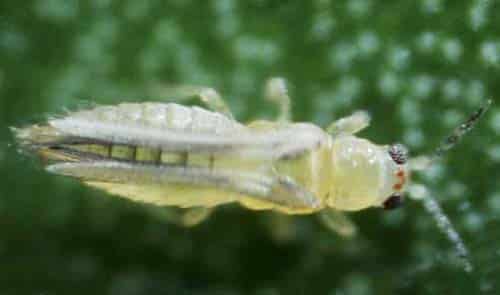
Tiny Terror: Prevent Chilli Thrips in Your Garden!
Here at Rockaway Landscaping, we know you love keeping your garden beautiful. But there’s a new invasive pest on the block – the chilli thrips! These tiny insects, about the size of a pen tip, can wreak havoc on your ornamental plants, fruits, and vegetables.
- Scientific name: Scirtothrips dorsalis Hood
- Also known as yellow tea thrips, castor thrips, or strawberry thrips
- Native to Southeast Asia with worldwide distribution including establishment in warm Sothern states including Florida and spreading
- Thrive in warm weather and can reproduce quickly
What agricultural threats do chilli thrips pose?
- Devastating crop losses: Up to 80% of strawberry yields can be lost to chilli thrips infestations! They also damage other important crops like peppers, tomatoes, eggplants, and beans.
- Economic impact: The potential annual losses across the U.S. are estimated to be in the billions of dollars.
- Spreading rapidly: Chilli thrips are not picky eaters and attack a wide range of plants. This makes it difficult to control their spread and poses a threat to a variety of agricultural industries.
What plants do they attack?
- Roses, Citrus trees, Many vegetables (peppers, tomatoes, eggplant, etc.), Strawberries, and more than 225 other plant species!
How can you spot them?
- Look for tiny, black specks on the undersides of leaves. These are thrips themselves or their droppings.
- Leaves may have a silvery or bronzed appearance on the upper surface.
- Look for distorted or discolored flower buds and fruits.
- Use sticky traps (ideally blue) to monitor for thrips.
How can you protect your plants?
- Enroll in our Landscape Maintenance, which includes Integrated Pest Management! Our experts will regularly inspect your plants for signs of chilli thrips and other pests, allowing for early detection and intervention. This can significantly reduce the damage thrips cause and protect your valuable plants.
- In addition to our program, you can also:
- Prune away any damaged plant parts and dispose of them properly.
- Consider using horticultural soap, oils, or other organic controls for light infestations.
- Biological controls include the beneficial insect pirate bugs and entomopathogenic nematodes.
- Insecticidal sprays may be necessary including imidacloprid, acetamiprid, spinetoram, or pyrethroids, but should be should be applied by a professional as they can develop resistance.
Shield your landscape from tiny terrors! Enroll in Rockaway’s Landscape Maintenance program with Integrated Pest Management included Our experts include Agronomics Manager Ryan Mobley, and Associate Certified Entomologist Neal McCullough.
From our office in Atlantic Beach and satellites throughout Northeast Florida, Rockaway Inc proudly serves both commercial and residential sustainable landscape design, maintenance, lawn care, irrigation, and outdoor living carpentry client needs in Jacksonville, St Augustine, Atlantic Beach, Neptune Beach, Jacksonville Beach, Ponte Vedra, Nocatee, St. Johns, and Fernandina Beach.

